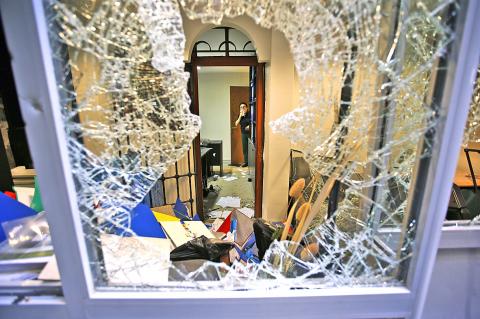Thailand yesterday deported more than 100 Uighur refugees to China, drawing harsh criticism from the UN refugee agency and human rights groups over concerns that ethnic minority members face persecution by the Beijing government.
Protesters in Turkey, which had accepted an earlier batch of Uighur refugees from Thailand, ransacked the Thai consulate overnight.
The Turkish Ministry of Foreign Affairs condemned Thailand, saying the deportation violated international humanitarian laws and came despite “numerous initiatives” by Ankara to prevent their repatriation. The statement, which says 115 were deported, said Turkey would continue to monitor their fate.

Photo: AP
Thai deputy government spokesman Major General Verachon Sukhonthapatipak said that Thailand had assurances from Chinese authorities about the safety of 109 Uighurs.
However, in Beijing, Chinese Ministry of Foreign Affairs spokeswoman Hua Chunying (華春瑩) said that China would take action against those suspected of breaking the law.
Thai Prime Minister Prayuth Chan-ocha said that as a third country, the matter was not Thailand’s problem, and that the place they were sent to — he did not name China — would take care of it according to its justice system.
“I’m asking if we don’t do it this way, then how would we do it?” he said. “Or do you want us to keep them for ages until they have children for three generations?”
He said that Thailand has good relations with Turkey.
“I want to explain to the Muslims that we do not mean to hurt anyone. We want to create peace as much as possible,” he said.
The UN High Commissioner for Refugees said it was “shocked” and considered Thailand’s action “a flagrant violation of international law.”
“I strongly urge the Thai authorities to investigate this matter and appeal to Thailand to honor its fundamental international obligations,” UN Assistant High Commissioner for Refugees Volker Turk said in a statement.
The Uighurs had been in Thailand for more than a year, along with others who had fled China and claimed to be Turkish, Verachon said. Thai authorities sought to verify their nationalities before relocating them, he said.
“We found that about 170 of them were Turkish, so they were recently sent to Turkey,” he said. “And about 100 were Chinese, so they were sent to China as of this morning, under the agreement that their safety is guaranteed according to humanitarian principles.”

CHAOS: Iranians took to the streets playing celebratory music after reports of Khamenei’s death on Saturday, while mourners also gathered in Tehran yesterday Iranian Supreme Leader Ayatollah Ali Khamenei was killed in a major attack on Iran launched by Israel and the US, throwing the future of the Islamic republic into doubt and raising the risk of regional instability. Iranian state television and the state-run IRNA news agency announced the 86-year-old’s death early yesterday. US President Donald Trump said it gave Iranians their “greatest chance” to “take back” their country. The announcements came after a joint US and Israeli aerial bombardment that targeted Iranian military and governmental sites. Trump said the “heavy and pinpoint bombing” would continue through the week or as long

TRUST: The KMT said it respected the US’ timing and considerations, and hoped it would continue to honor its commitments to helping Taiwan bolster its defenses and deterrence US President Donald Trump is delaying a multibillion-dollar arms sale to Taiwan to ensure his visit to Beijing is successful, a New York Times report said. The weapons sales package has stalled in the US Department of State, the report said, citing US officials it did not identify. The White House has told agencies not to push forward ahead of Trump’s meeting with Chinese President Xi Jinping (習近平), it said. The two last month held a phone call to discuss trade and geopolitical flashpoints ahead of the summit. Xi raised the Taiwan issue and urged the US to handle arms sales to

State-run CPC Corp, Taiwan (CPC, 台灣中油) yesterday said that it had confirmed on Saturday night with its liquefied natural gas (LNG) and crude oil suppliers that shipments are proceeding as scheduled and that domestic supplies remain unaffected. The CPC yesterday announced the gasoline and diesel prices will rise by NT$0.2 and NT$0.4 per liter, respectively, starting Monday, citing Middle East tensions and blizzards in the eastern United States. CPC also iterated it has been reducing the proportion of crude oil imports from the Middle East and diversifying its supply sources in the past few years in response to geopolitical risks, expanding

Pro-democracy media tycoon Jimmy Lai’s (黎智英) fraud conviction and prison sentence were yesterday overturned by a Hong Kong court, in a surprise legal decision that comes soon after Lai was jailed for 20 years on a separate national security charge. Judges Jeremy Poon (潘兆初), Anthea Pang (彭寶琴) and Derek Pang (彭偉昌) said in the judgement that they allowed the appeal from Lai, and another defendant in the case, to proceed, as a lower court judge had “erred.” “The Court of Appeal gave them leave to appeal against their conviction, allowed their appeals, quashed the convictions and set aside the sentences,” the judges